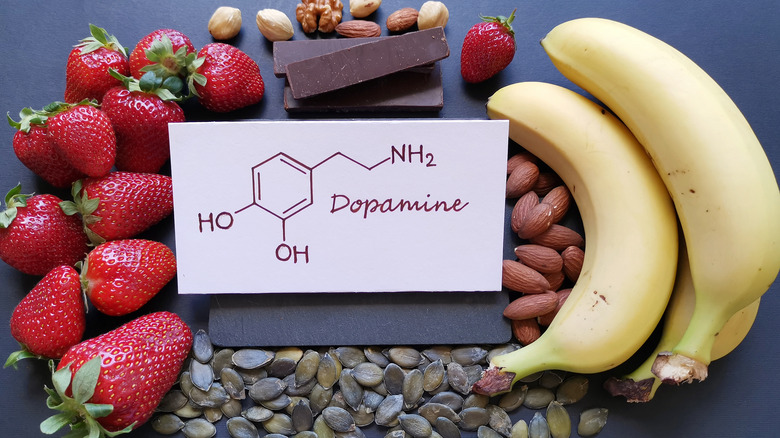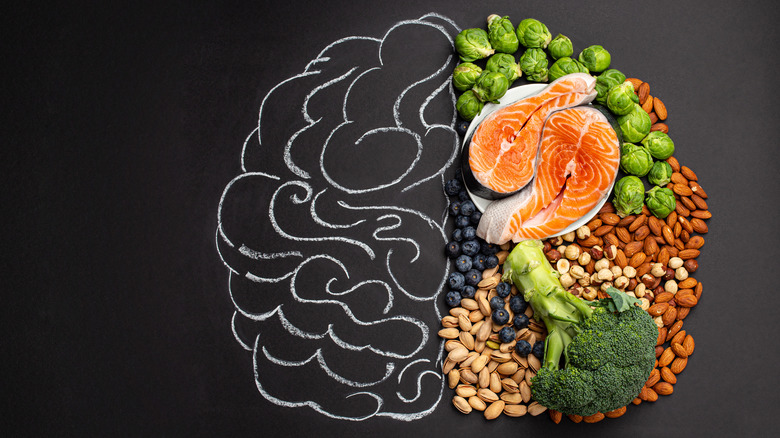With the vast array of tasks and responsibilities that we are required to balance on a daily basis, you’re likely no stranger to stress or its negative effects on the mind and body. Although we can’t always avoid stressful situations in our lives, there are ways we can alleviate the severity of the stress we experience.
In an exclusive interview with Health Digest, Kara Burnstine, MS, RD, LDN, CDCES, and Nutritionist at Pritikin Longevity Center, provides valuable insights for minimizing stress by altering the foods you eat in your diet. Understanding the influence of nutrition on stress levels begins with assessing what happens to the body when people are stressed. “When we experience stress, a cascade of events starts to occur. The main organizer, the central nervous system, signals the release of hormones called adrenaline and cortisol,” Burnstine explains. “These hormones allow our bodies to have heightened responses, allowing us to have extra strength and blood flow to areas that need it, otherwise known as the ‘fight or flight’ response.”
In light of this, not all stress is harmful to our body. “Moderate stress can be beneficial for your health as it can help you run faster from danger or even improve brain function to respond quickly to an emergency situation,” Burnstine shares. “But if this stress becomes chronic, the hormones can wreak havoc on our bodies and increase the risk for chronic diseases such as cardiovascular disease, diabetes, obesity, and the list goes on.”
How is our diet related to our stress levels?

There’s no doubt that the food you eat is critical to the quality of your health. Sometimes described as “fuel” for the body, food helps to keep us alive and provides us with the energy we need to get through the day. It’s important to know, however, that some foods are better for our mental and physical health than others.
Burnstine explains that the food we eat has a direct connection to the activity in our brain. “When we eat certain foods that are refined or processed like sugary sodas, pastries, and potato chips, we may feel a temporary boost in dopamine levels, our pleasure center in the brain,” she points out. “The problem is this boost is temporary and not necessarily good for our health. These foods increase inflammation in the body and may increase the risk for diseases mentioned above and not to mention sleeping problems, depression, digestive issues, decreased cognitive function and more.” The American Journal of Lifestyle Medicine published a 2024 overview that further explains how a chronic unhealthy diet can contribute to a host of physical and mental health problems.
With Burnstine’s illustration, she reiterates the negative effects of processed food on our overall well-being. Unfortunately, the American Psychological Association (APA) reports that many people often turn to high-calorie and high-fat foods as a coping mechanism during times of increased stress, which can negatively impact their energy levels as well as their self-esteem.
Which foods and eating habits can help alleviate stress?

Luckily, it turns out that our stress levels can be relieved without eating highly processed foods. Burnstine provides a ray of hope when she tells us, “The good news is there are other dopamine and serotonin boosting foods that are good for our health.” She reveals that some of these foods include vegetarian proteins like lentils, beans, edamame, and fruits. Salmon, tofu, and poultry also contain tryptophan, which healthfully support serotonin production. Furthermore, the Cleveland Clinic suggests stress-relieving foods are high in vitamin B, omega-3 fatty acids, magnesium, and protein.
As far as healthy eating practices go, “That part takes a little tinkering with and knowing what works best for your lifestyle and personality,” Burnstine shares. “My answer is that you really need to find the diet pattern that fits best for your schedule and lifestyle.”
Burnstine suggests paying attention to hunger and fullness cues inside your body. When working with her clients, she notices that they benefit from understanding their unique hunger cues. “They realize that when they eat low calorie dense foods including vegetables, fruits, and unrefined complex carbohydrates (potatoes, sweet potatoes, legumes, and whole grains), they notice they feel more satisfied, more energized and their desire for the refined, high calorie dense foods goes down,” she explains. “Their shoulders drop, stress levels go down, everything just starts flowing in the right direction.”
You can find out more about Kara Burnstine by visiting the Pritikin Longevity Center website.




